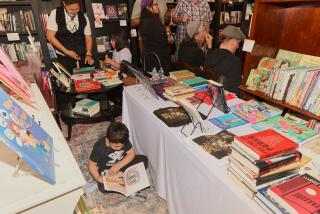Publisher Finds Delight, Fulfillment in One-of-a-Kind Books
- Share via
Alan James Robinson’s courtship with excellence has led him backward to the rarest form of publishing--one-of-a-kind books.
The handmade editions from his small publishing company in Easthampton, Mass.--like those from medieval monasteries--are not what you’ll find in the corner bookstore. Look instead, if you can gain entry, in the private dens of rich collectors or rare book rooms of discriminating libraries.
Elegantly bound, hand-lettered, and individually illustrated, only one of each is ever made. They sell for thousands of dollars apiece.
Hand-Lettered Text
“The Black Cat,” by Edgar Allan Poe, was the first. It’s a 12-by-15-inch volume with 13 watercolors and pen-and-ink drawings, the text hand-lettered by calligrapher Suzanne Moore, and exquisitely hand-bound. It sold for $4,500 to a collector in Belgium.
Robinson, interviewed during a convention of the American Booksellers Assn. in New Orleans, said the Poe volume fits nicely with the antiquarian delights in the Belgian’s collection, displayed alongside musty old rare editions in their fading leather bindings.
Faced with a limited number of Gutenberg Bibles, medieval texts and other collectibles, collectors treasure these one-of-a-kind books, the ultimate in first (and last) editions.
Robinson, the moving force behind the Cheloniidae Press in Easthampton, did not dream of this kind of work when he was painting houses in 1979 to buy an etching press.
He named the company for sea turtles, the subject of oversized 2-by-3-foot engravings he did as a student. For a printmaker, it was a small step from showing a series of prints to binding them into not-so-regular “art books” in limited editions.
Robinsons said the handmade editions have been well-received.
‘Jumping Frog’ Wanted
One collector wants a private edition of a story by Kipling, several have asked for one-of-a-kind erotic works, and two want individual copies of Mark Twain’s “The Celebrated Jumping Frog of Calaveras County.”
Like the “The Black Cat,” “The Jumping Frog” was originally published by Cheloniidae in an art edition that seemed at the time too audaciously limited--250 copies in the $125 regular edition, 50 in the $375 deluxe edition and 15 in the limited $1,500 edition, which sported a full-leather binding with an on-lay of four frogs.
The demand for his “Jumping Frog” was heavy, but with the number printed strictly controlled, Robinson said, he turned down 19 orders for the $1,500 version.
“The Jumping Frog,” which came out in 1985, included 15 wood engravings.
When he started in 1979 at the age of 29, Robinson was studying fine arts at the University of Massachusetts. He sold a sculpture to Joel Ginsburg. The two struck up a friendship and eventually decided to launch an unusual publishing house.
Handmade Inks and Papers
That first limited edition book was Poe’s “The Raven,” published as it might have been with the exacting standards of 1845 when good books were keepsakes--handmade inks and papers, old-style glues, hand-set type and French paper.
Now out of print, “The Raven” was limited to 100 copies, at a hard-to-sell $275, 29-page edition. It had five full-page etchings, with wood engravings for a frontispiece.
Robinson demanded the best typesetters, printers, papers, binders and, of course, executed his own prints.
The first copy went to Robinson’s mother, and the second to Ginsburg. Then there was a long wait.
“We went to bookstores and started hawking it,” Robinson said. “They said it was a beautiful book, but who can afford $275?”
Antiquarian Book Fair
Who indeed, but antiquarian book collectors? On one of his rounds, Robinson made the Harvard Antiquarian Book Fair and in about three hours sold 11 of the deluxe edition at $475 and more than 20 of the regular edition.
“All these dealers said, ‘Please don’t step backward. This is your first book. Keep your quality,’ ” Robinson said.
The edition eventually sold out, and some, he said, now fetch a neat $1,500--if you can find a seller.
No reprints, Robinson said, no reprints ever. Once an edition is out, it is out.
However, in an unusual twist, Robinson did publish a second version of “The Raven”--completely redesigned in a limited $125 edition of 150 copies.
Hesitated on Project
“I found out no artist has ever illustrated the same book twice,” Robinson said, describing the hesitation with which he undertook the project. “I was afraid it would be something like literary hara-kiri.”
The second book, with nine new engravings plus an etched portrait of Poe, came out in April of this year--225 copies.
Next will be a trade facsimile edition available in ordinary bookstores at an ordinary price for ordinary people.
It will not, however, be an ordinary book, Robinson insisted. Published by Northeastern University Press, it must adhere to Robinson’s exacting standards of quality, although mass-produced.
The first joint venture between Northeastern and Cheloniidae was the publication in April of a $14.95 trade edition of “The Black Cat.” With 3,500 copies in the press run, the edition exceeded the total output of Cheloniidae since 1979.
People Will See Work
Because of the trade editions, larger numbers of people will see Robinson’s woodcuts and engravings without having to seek out rare book rooms in libraries that are buying collections, such as Yale, Harvard, or the National Library of Scotland.
In the works is a trade edition of his “Odd Bestiary.” Arranged as an abecedary, it is a kind of guide to bestiaries, including two prints of real and mythical animals for each letter of the alphabet.
Not yet planned for everyman, but something to look for, is Robinson’s “Roadkills,” an illustrated collection of poems about dead creatures beside the road.
In the short history of the Cheloniidae, he has also done “Of Unicornes Hornes” from the 1646 text by Sir Thomas Browne, an explicit “Leda” with text by Pierre Louys, and other renderings of animals and birds, including “Cetacea: The Great Whales,” an outsized portfolio of etchings.
His mailing list for these limited editions exceeds 600, and he is optimistic enough about sales to be planning fine printing projects on “The Birds and Beasts of Shakespeare,” “Great American Indian Chiefs, “Raptors,” and another Poe, “The Descent Into the Maelstrom.”
More to Read
Sign up for our Book Club newsletter
Get the latest news, events and more from the Los Angeles Times Book Club, and help us get L.A. reading and talking.
You may occasionally receive promotional content from the Los Angeles Times.







